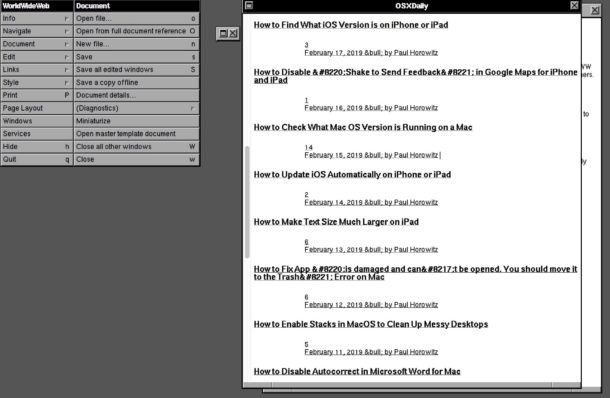Run the Very First Web Browser from 1990, WorldWideWeb

Have you ever wanted to know what browsing the web was like at the very beginning of the web, way back in 1990? Thanks to some retro efforts by a team at CERN (yes the same CERN that built the Large Hadron Collider), you can now try out the very first ever web browser, called WorldWideWeb (and yes, as you may have guessed that’s where the WWW name and acronym comes from). Best of all, this WorldWideWeb rebuild loads just fine in any modern web browser of today, and you can even load many modern websites!
Because the majority of the modern web still uses HTML, the 30 year old WorldWideWeb browser is still able to load most websites you probably visit today, including the one you’re reading right now. It only loads text though (HTTP stands for Hyper Text Transfer Protocol after all) so the experience is sort of like running Lynx at the command line but a bit more limited – this thing is a 30 year old original web browser after all. Regardless, it’s kind of fun to geek around with!
Using the WorldWideWeb browser today is simple:
All you need is a modern web browser, which you’re likely using now to read this website (Chrome, Safari, Firefox, Opera, etc). Then just do the following:
- Go to worldwideweb.cern.ch/browser/ here
- To open a new web page URL, choose “Document” from the left side menu, then choose “Open from full document reference” and type in a URL (for example, https://osxdaily.com) then press the ‘Open’ button
- Double-click links to open them, each new link opens in a new window within the WorldWideWeb browser


Navigating websites with the WorldWideWeb browser is fairly awkward compared to what you’re used to, but it is three decades old and offers a look at the web at its infancy.
This is obviously not the most practical endeavor of all time, but it’s pretty amazing that you can recreate a historical web browser and get it working today in a very different era of the internet.
While WorldWideWeb is the very first web browser, many longtime Macintosh users may have used other early web browsers in the halcyon days of the early web. Maybe your first web browser was WorldWideWeb, Erwise, ViolaWWW, NCSA Mosaic (my personal first), Netscape Navigator, or Internet Explorer (remember when it used to be called “The Internet” on Windows 95?), or maybe it was Safari, Firefox, Chrome, Opera, or any of the other later and more modern web browsers.
Anyway, this is just yet another fun retro geeky thing to play around with, so check it out if you’re a fan of techy nostalgia. You probably won’t be using WorldWideWeb as your default browser anytime soon, but that’s not quite the point.

Thanks to Daringfireball for the cool find!


That’s quite a experience running the original version of the WWW.
I had a NeXT turboslab from the early 90’s for a while – so seeing this was a blast from the past.
I also used mosaic at first, I think – I managed to get a clunky 286 from 1989 to load a tcp/ip stack, and hacked up windows 3 (maybe 3.1) to work with it via a dial up connection with a local bbs. This was all in 1992. Wrote a bunch of web pages, back when there were only a few hundred of those out there.
Wow, I always thought mosaic was the first. Along with Trumpet in order to get TCP/IP on windows 3.1
Oh wow, I had forgotten about Trumpet!
Thanks for the fun memory!
Very cool! What is the connection with NeXT?
The application WorldWideWeb was first developed in NeXTSTEP, which is why it has that UI appearance.
Now given that NeXTSTEP was created by NeXT Computer, which was started by Steve Jobs in his wilderness years from Apple (after he was fired from his own company!), which NeXT was then later bought by Apple thus bringing Steve Jobs back to Apple… forming the foundation of Mac OS X as well (which is what iOS is based on too), which has led us to the modern era of Apple as a wildly successful company, it’s all really quite meta and amazing to be emulating this in a web browser on the Macintosh.
What a fantastic story of internet history and computing history, it’s really quite something.